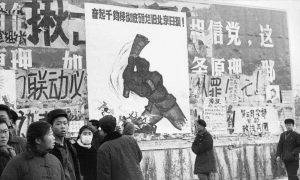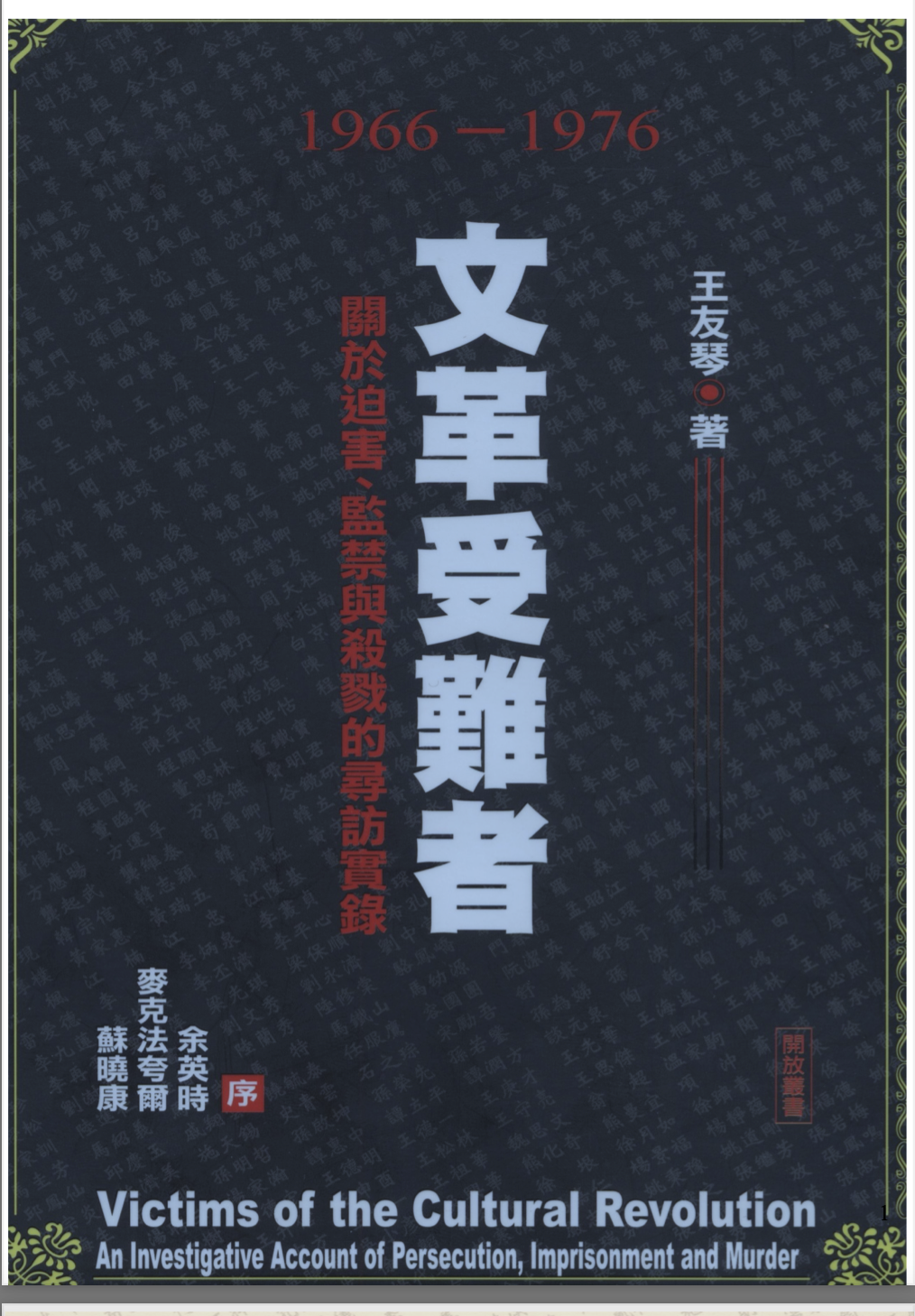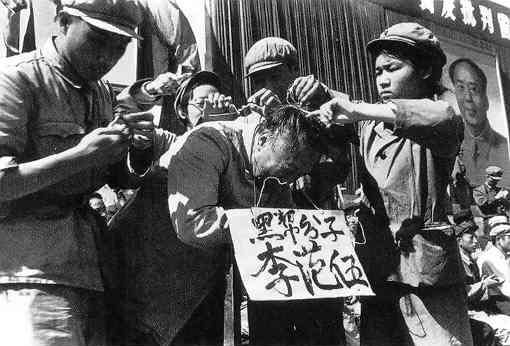Chinese Regime Blocked US-Based Website Honoring Victims of Cultural Revolution
The Chinese communist regime recently blocked a memorial website for victims of the Cultural Revolution, a small online platform personally maintained by a Chicago University professor.This was the second time the website was blocked by the regime. The Cultural Revolution, formally known as the Great Proletarian Cultural Revolution, was a communist sociopolitical movement that took place in China between 1966 and 1976. Historians have estimated that the movement caused a death toll of millions in China before it ended with the death of Chairman Mao Zedong in 1976. Youqin Wang is a professor teaching the Chinese language at the Department of East Asian Languages and Civilizations. Since 2000, she has maintained an online space named “Chinese Holocaust Memorial — Memorial for Victims of The Chinese Cultural Revolution.” The website publishes the personal stories of victims of the Cultural Revolution. The stories Wang put online were, one by one, verified with details, and recorded by herself. Currently, the website has detailed stories of more than 1,000 victims. The original website was launched in October 2000, but only survived for 17 months, before it was censored by the Chinese Communist Party’s (CCP) internet police. However, the stories Wang published garnered much attention from the American media outside China. The cover page of professor Youqin Wang’s book “Victims of the Cultural Revolution.” (Courtesy of Youqin Wang) In January of this year, Wang started a new website, after which Wang received lots of feedback from her readers living in China, praising her new site. As recognition for her efforts, Wang received this year’s special award from the Chinese Democratic Education Foundation (CDEF), a California-based nonprofit organization with a mission to promote democracy in China. “We gave Youqin Wang the special contribution award hoping to encourage more people to make efforts to investigate the details of the bloody crimes conducted by the Chinese Communist Party,” said Zheng Fang, chairman of the CDEF during a phone interview with The Epoch Times. Fang himself became a victim of the CCP’s brutality in 1989, when both of his legs were crushed by Chinese military tanks during the massacre at Tiananmen Square. But not long after Wang received the CDEF award in June, Wang was told by her readers in China that they were no longer able to access the new link. This time, Wang’s website survived less than six months. Fang Zheng in his home on Feb. 20, 2019. The Chinese words painted on the van say: “End the Chinese Communist Party regime, and build new constitutional democracy in China.” (Courtesy of Fang Zheng) “History shall not be just a number [of a total death toll]. History shall be detailed stories of individuals,” Wang told The Epoch Times when explaining what motivated her to start collecting the victims’ stories. Wang started writing investigative reports on victims of the Cultural Revolution in 1986. Her first report was about her high school vice principal, who was beaten to death by Red Guard students on Aug. 5, 1966. Wang personally witnessed the crime herself. The report was later published in English in 2001 and in Japanese in 2017. The Red Guards were a student-led paramilitary social movement that was established during the Cultural Revolution by Mao’s followers. Wang told The Epoch Times that through her own investigation, she identified more than 1,700 people who died because of political persecution in Beijing in 1966. At the high school she attended, besides the death of the vice principal, three teachers committed suicide because of political persecutions. In her paper titled “Humanity Day,” published in October 2017, Wang wrote the following paragraph to describe how the CCP’s “class struggle” took place during the Cultural Revolution: “Unlike Stalin’s ‘show trials,’ the Chinese ‘Struggle Session’ did not even attempt to feign legal proceedings. Unlike the Soviet Union’s organized and remote ‘Gulag Archipelago,’ the Chinese system of so-called “Cowsheds” were informal jails established at every workplace where not only millions of innocent victims were murdered but also poisoned the morality of the Chinese people.” Wang was born in 1952 and grew up in Beijing. Both of her parents were college instructors. After the Cultural Revolution started in May 1966, her parents were both labeled as “counter-revolutionaries” because Wang’s father openly criticized the Cultural Revolution as unconstitutional. Both Wang’s parents personally lived through the CCP’s political persecution. After high school, Wang was sent to Yunnan, a remote province in the western part of China, to receive reeducation by peasants. During the Cultural Revolution years, Mao sent all urban area young adults after their secondary education to countryside villages to be reeducated by peasants. The CCP called this process the “Up to the Mountains and Down to the Countryside Movement.” Communist P

The Chinese communist regime recently blocked a memorial website for victims of the Cultural Revolution, a small online platform personally maintained by a Chicago University professor.
This was the second time the website was blocked by the regime.
The Cultural Revolution, formally known as the Great Proletarian Cultural Revolution, was a communist sociopolitical movement that took place in China between 1966 and 1976. Historians have estimated that the movement caused a death toll of millions in China before it ended with the death of Chairman Mao Zedong in 1976.
Youqin Wang is a professor teaching the Chinese language at the Department of East Asian Languages and Civilizations. Since 2000, she has maintained an online space named “Chinese Holocaust Memorial — Memorial for Victims of The Chinese Cultural Revolution.” The website publishes the personal stories of victims of the Cultural Revolution. The stories Wang put online were, one by one, verified with details, and recorded by herself. Currently, the website has detailed stories of more than 1,000 victims.
The original website was launched in October 2000, but only survived for 17 months, before it was censored by the Chinese Communist Party’s (CCP) internet police. However, the stories Wang published garnered much attention from the American media outside China.

In January of this year, Wang started a new website, after which Wang received lots of feedback from her readers living in China, praising her new site. As recognition for her efforts, Wang received this year’s special award from the Chinese Democratic Education Foundation (CDEF), a California-based nonprofit organization with a mission to promote democracy in China.
“We gave Youqin Wang the special contribution award hoping to encourage more people to make efforts to investigate the details of the bloody crimes conducted by the Chinese Communist Party,” said Zheng Fang, chairman of the CDEF during a phone interview with The Epoch Times. Fang himself became a victim of the CCP’s brutality in 1989, when both of his legs were crushed by Chinese military tanks during the massacre at Tiananmen Square.
But not long after Wang received the CDEF award in June, Wang was told by her readers in China that they were no longer able to access the new link.
This time, Wang’s website survived less than six months.

“History shall not be just a number [of a total death toll]. History shall be detailed stories of individuals,” Wang told The Epoch Times when explaining what motivated her to start collecting the victims’ stories.
Wang started writing investigative reports on victims of the Cultural Revolution in 1986. Her first report was about her high school vice principal, who was beaten to death by Red Guard students on Aug. 5, 1966. Wang personally witnessed the crime herself. The report was later published in English in 2001 and in Japanese in 2017.
The Red Guards were a student-led paramilitary social movement that was established during the Cultural Revolution by Mao’s followers.
Wang told The Epoch Times that through her own investigation, she identified more than 1,700 people who died because of political persecution in Beijing in 1966. At the high school she attended, besides the death of the vice principal, three teachers committed suicide because of political persecutions.
In her paper titled “Humanity Day,” published in October 2017, Wang wrote the following paragraph to describe how the CCP’s “class struggle” took place during the Cultural Revolution:
“Unlike Stalin’s ‘show trials,’ the Chinese ‘Struggle Session’ did not even attempt to feign legal proceedings. Unlike the Soviet Union’s organized and remote ‘Gulag Archipelago,’ the Chinese system of so-called “Cowsheds” were informal jails established at every workplace where not only millions of innocent victims were murdered but also poisoned the morality of the Chinese people.”
Wang was born in 1952 and grew up in Beijing. Both of her parents were college instructors. After the Cultural Revolution started in May 1966, her parents were both labeled as “counter-revolutionaries” because Wang’s father openly criticized the Cultural Revolution as unconstitutional. Both Wang’s parents personally lived through the CCP’s political persecution.
After high school, Wang was sent to Yunnan, a remote province in the western part of China, to receive reeducation by peasants. During the Cultural Revolution years, Mao sent all urban area young adults after their secondary education to countryside villages to be reeducated by peasants. The CCP called this process the “Up to the Mountains and Down to the Countryside Movement.”

After the death of Mao in 1976, China’s colleges and universities started admitting students in 1977 based on examinations. Wang took the exam in Yunnan Province and earned the top score in the province. However, no universities admitted her because her parents were considered counter-revolutionaries.
Wang took the exam again in 1979 and earned the top score in the whole country. She was finally admitted to Beijing University. Wang eventually got her Ph.D. in China and came to the United States in 1988 as a Chinese language professor at Stanford University.
In a phone interview with The Epoch Times, Wang said that during the Cultural Revolution, there were 63 people who died of political persecution at Beijing University, but only one of the victims’ remains were found and buried. Wang hopes the online Chinese Holocaust Memorial can serve as a final resting place of victims like the 62 whose bodies were never found.
Since the new website was established in January, many members of the victim’s families in China have visited Professor Wang’s online platform to read the stories of their loved ones who died during the Cultural Revolution.
This website is now no longer accessible to them.












